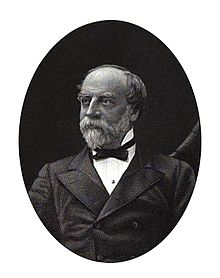Alexander Hamilton Rice
| Alexander Hamilton Rice | |
|---|---|
 |
|
| 30th Governor of Massachusetts | |
|
In office January 6, 1876 – January 2, 1879 |
|
| Lieutenant | Horatio G. Knight |
| Preceded by | William Gaston |
| Succeeded by | Thomas Talbot |
| Member of the U.S. House of Representatives from Massachusetts's 3rd district |
|
|
In office March 4, 1863 – March 3, 1867 |
|
| Preceded by | Benjamin Thomas |
| Succeeded by | Ginery Twichell |
| Member of the U.S. House of Representatives from Massachusetts's 4th district |
|
|
In office March 4, 1859 – March 3, 1863 |
|
| Preceded by | Linus B. Comins |
| Succeeded by | Samuel Hooper |
| 15th Mayor of Boston, Massachusetts | |
|
In office 1856–1858 |
|
| Preceded by | Jerome V.C. Smith |
| Succeeded by | Frederic W. Lincoln, Jr. |
| Personal details | |
| Born |
August 30, 1818 Newton, Massachusetts |
| Died | July 22, 1895 (aged 76) Melrose, Massachusetts |
| Political party | Republican |
| Spouse(s) | Augusta E. McKim (d. 1868) Angle Erickson Powell |
| Signature | |
Alexander Hamilton Rice (August 30, 1818 – July 22, 1895) was an American politician and businessman from Massachusetts. He served as Mayor of Boston from 1856 to 1857, a U.S. Congressman during the American Civil War, and as the 30th Governor of Massachusetts from 1876–78. He was part owner and president of Rice-Kendall, one of the nation's largest paper products distributors.
Educated at Union College, Rice was for many years involved in the paper business, and entered Boston politics in 1853. As mayor, he helped broker an agreement that began development of its Back Bay area. His Congressional service included the introduction of the failed Crittenden Compromise, oversight of naval affairs during the Civil War, and resistance to Radical Republican actions. As governor, he promoted social reform legislation and reductions in working hours.
Alexander Hamilton Rice was born in Newton Lower Falls, Massachusetts, to Thomas and Lydia (Smith) Rice, on August 30, 1818. His father, a Brighton native, owned a paper manufacturing business in Newton, and both parents had deep colonial roots. He was first educated in the Newton public schools, and then at private schools in Needham and Newton. He first clerked at a Boston dry goods store, and then apprenticed in the Boston paper distributor Wilkins, Carter, and Company in Boston. In 1840 he entered Union College in Schenectady, New York, graduating as class valedictorian in 1844. He was injured in a fall from a horse in 1844, which disfigured his face and gave him a speech impediment. This prompted him to give up thoughts of pursuing a career in law, and he instead focused on business. He was eventually able to overcome his speech problems, and later became well known as a commanding speaker.
...
Wikipedia
